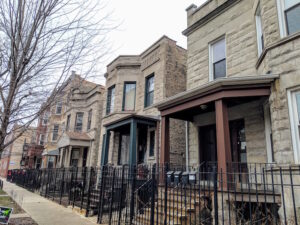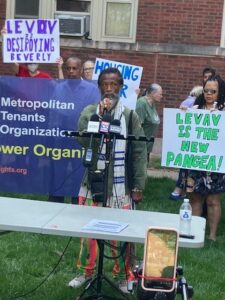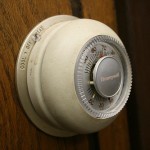What is the Keep Chicago Renting Ordinance?
The City of Chicago enacted the Protecting Tenants in Foreclosed Rental Property Ordinance, commonly known as the Keep Chicago Renting Ordinance (KCRO), in response to the harmful effect of the mortgage foreclosure crisis on renters in Chicago. The ordinance aims to keep renters in their homes by requiring new building owners to offer bonafide tenants a lease renewal or $10,600 in relocation assistance. You can view the full text of the ordinance by scrolling down or clicking here.
The KCRO Requires New Owners to Serve Tenants with Written Notice of Change in Ownership Notice of change in ownership must be provided within 21 days after a person becomes an owner or within 7 days of determining the tenant’s identity. Notice must be delivered to known tenant or household member 13 years or older or mailed. In addition, notice must be posted on the primary entrance of each foreclosed property . Chicago Municipal Code, § 5-14-040(a),(b)
The Ordinance requires that the notice be given in English, Spanish, Polish and Chinese. The Lawyers’ Committee for Better Housing (LCBH) has translated the notice and those translations may be used by owners to inform their tenants in accordance with the law. The notices can be downloaded by clicking here.
The KCRO Requires Notice Before the Owner Can Collect Rent
Until the owner serves notice under § 5-14-040, the owner cannot collect rent or terminate a tenant’s lease for failure to pay rent. Chicago Municipal Code, § 5-14-040(c).
The KCRO Requires Owners to Renew or Extend Leases or Pay Substantial Relocation Assistance
The Ordinance requires the owner of a foreclosed rental property to either:
- offer the Qualified Tenant a renewal or extension of their lease with a rent increase of no more than 2%; or
- pay the tenants a relocation fee of $10,600 within seven days of the Qualified Tenant vacating the unit. Chicago Municipal Code, § 5-14-050(a).
If the owner elects to offer a lease, the owner must continue to offer renewals or extensions (with rent increases of no more than 2% per year) until the owner sells the property to a “bona fide third-party purchaser.” Chicago Municipal Code, § 5-14-050(g).
What Tenants Are Entitled to Protections Under the Ordinance?
The Ordinance protects “Qualified” tenants who have a bona fide (valid) lease or rental agreement. The definition of a bona fide lease or rental agreement includes all agreements, whether written or oral, as long as:
- The tenant is not the mortgagor, or the child, spouse, or parent of the mortgagor;
- The lease or tenancy was the product of an arm’s-length transaction; and
- The rent required under the lease or tenancy is not substantially less than fair market or is subsidized by the government. Chicago Municipal Code, § 5-14-020.
In other words, leases entered into with children, parents, or the spouse of the former owner; leases where both parties did not negotiate in their own best interest; and leases with substantially less than fair market rent are not considered bona fide, and tenants without bona fide leases are not qualified tenants under the Ordinance.
Which Property Owners Are Subject to the Ordinance?
- any person who acquires ownership of a property pursuant to a judicial sale of a foreclosed rental property, after the sale has been confirmed by the court and any special right of redemption has expired; or
- mortgagees that acquire ownership of a property through foreclosure or a deed in lieu of foreclosure. Chicago Municipal Code, § 5-14-020.
Which Property Owners Are Not Subject to the Ordinance?
- an owner of a foreclosed rental property who was the owner prior to the effective date of the Ordinance;
- a person appointed as a receiver and issued or assigned, a Receiver’s Certificate; or
- a bona fide not-for-profit in existence continuously for a period of five years immediately prior to becoming the owner of the rental unit and whose purpose is to provide financing for the purchase or rehabilitation of affordable housing. Chicago Municipal Code, § 5-14-030.
Penalties
If an owner fails to comply with § 5-14-050 (Tenant relocation assistance), the qualified tenant shall be awarded damages in an amount equal to two times the relocation assistance fee. Chicago Municipal Code, § 5-14-050(f). Penalties for violation of the KCRO are significant enough that LCBH expects substantial compliance.
NEED ASSISTANCE? Call the LCBH’s free Tenants in Foreclosure Help Line: 312-784-3507 or call our free Tenants Rights Hotline, Monday-Friday between 1:00pm – 5:00pm: 773-292-4988.
To find out if your building is in foreclosure, click here and follow the step-by-step instructions.
——————————————————————————————-
The “Keep Chicago Renting” Ordinance
Section 1. Title, Purpose and Scope.
This chapter shall be known and may be cited as the “Keep Chicago Renting” ordinance and shall be liberally construed and applied to promote its purposes and policies. It is the purpose of this ordinance, in order to protect, maintain, and improve foreclosed rental property, preserve rental housing stock, mitigate losses to area property values, and avoid neighborhood destabilization due to foreclosure, to prevent vacant foreclosed residential buildings and preserve tenancies in these properties. Except when this ordinance conflicts with the statutory or regulatory provisions governing federal housing subsidy programs, including, but not limited to, public housing and project-based Section 8 housing operating pursuant to 42 U.S.C. § 1437 et seq., the provisions of this ordinance shall apply to and regulate ei;er3′ foreclosed property in which occupants hold possession of dwelling units. The rights, obligations and remedies established by this ordinance shall be cumulative and in addition to any others available at law or in equity. Nothing in this ordinance shall affect a landlord’s obligation to provide notice of termination of tenancy as required under applicable laws governing actions for possession.
Section 2. Definitions.
Whenever used in this ordinance, the following words and phrases shall have the following meaning:
(a) “Dwelling unit” means a structure or the part of a structure used as a home, residence or sleeping place by one or more persons who maintain a household, together with the common areas, land and appurtenant buildings thereto, and all housing services, privileges, furnishings and facilities supplied in connection with the use or occupancy thereof, including garage and parking facilities; except that this ordinance shall not govern dwelling units described in Subsections 5-12-020 (b) and, (c) of this Code.
(b) “Foreclosed property” means any property for which legal and equitable interests in real estate were terminated by a foreclosure action brought under the Illinois Mortgage Foreclosure Law (“IMFL”), 735 ILCS 5/15-1101 et seq.
(c) “Foreclosing owner” means a person or entity, or an agent acting on behalf of a person or entity that holds title in any capacity, directly or indirectly, to a foreclosed property and either (1) was a mortgagee who was a party to the foreclosure or is the subsidiary, parent, trustee, nominee or agent; or (2) is the Federal National Mortgage Association or the Federal Home Loan Mortgage Corporation.
(d) “Occupant” means any person in lawful physical possession of a dwelling unit in all or part of a foreclosed property and as described under Sections 1223 and 1508.5 ofthe IMFL.
(e) “Tenant” means a person entitled by written or oral agreement, subtenancy approved by the landlord or by sufferance to occupy a dwelling unit to the exclusion of others, as defined by the Chicago Residential Landlord Tenant Ordinance (“RLTO”) in Section 5-12-030 of this Code.
(f) “Bona fide third party purchaser” means a person or entity that is not a foreclosing owner and purchases the foreclosed property from the
foreclosing owner.
Section 3. Eviction of Occupants Prevented; Exceptions.
A foreclosing owner may not maintain an action for possession, except in accordance with this ordinance or unless a binding purchase and sale agreement has been executed and is in effect for the purchase of the dwelling unit by a bona fide third party purchaser.
Section 4. Notice Requirements.
Within 21 days of taking title to foreclosed property, a foreclosing owner must notify in writing all occupants of dwelling units of the real estate using the text provided in subsection (d) of this section. This notice must be printed in English and Spanish in no less than 14 point type, on paper at least eight and one-half inches by 11 inches in size.
(a) Service requirements shall be satisfied i f the foreclosing owner has (i) posted this notice in a prominent location in the building; (ii) mailed this notice by first class mail to each unit; and (iii) has made an attempt to personally serve an occupant of each unit in the building.
(b) The Commissioner of the Department of Housing and Economic Development (DHED) shall make available for distribution, both in print and in an easily printable format on the department’s Internet website, the following notice in English with a Spanish translation that may be used to satisfy the notice requirements of this section.
(c) Compliance and Curing Noncompliance. For purposes of collecting rent or maintaining an action for possession as described in Section 5, a foreclosing owner may cure a failure to timely provide notice by providing the notice more than 21 days after the transfer of title. Curing the notice deficiency, however, shall not waive any occupant’s right to remedies as described in Section 8 of this ordinance. Additionally, a foreclosing owner shall have no right to collect back rent that accrued during the period of time that the foreclosing owner was not in compliance with the notice requirements of this section.
(d) Text of Notice Provision:
IMPORTANT NOTICE TO OCCUPANTS
City of Chicago law requires that we provide you this notice informing you of your rights as occupants of [INSERT PROPERTY ADDRESS]. This property is now owned by [INSERT NAME OF FORECLOSING OWNER]. The former owner of this property no longer owns the property because the property was foreclosed. Chicago law protects your right to remain in your home after a foreclosure. [NAME OF ORDINANCE AND CITATION]. This law protects all occupants, even if you do not have a written lease. The law states that you cannot be evicted just because your building was foreclosed. You do not have to pay the new owner any rent owed before the due date provided in this notice. You can only be evicted if you do not pay rent starting on the due date provided in this notice, if you commit a crime or allow someone you know commit a crime in your home, if you damage your home, or if you refuse to let the new owner inspect your home and make necessary repairs. You can only be evicted after the new owner of this building files an eviction claim in court and you are given a chance to defend yourself in front of a judge. You can only be removed from your home by personnel of the Cook County Sheriffs office with an order from the court. Your rent cannot be raised unless the new owner of this building files in court and you have had a chance to defend your current rent in front of a judge. The former owner of this building has no right to collect rent since the former owner does not own the building anymore. You should now pay your rent to the new owner of this building: [INSERT NAME, ADDRESS, AND TELEPHONE CONTACT INFORMATION OF THE FORECLOSING OWNER, THE BUILDING MANAGER, OR OTHER REPRESENTATIVE OF THE FORECLOSURE OWNER RESPONSIBLE FOR COLLECTING RENT]. Please pay your rent on the [INSERT DAY] of each month by [INSERT METHOD OF TRANSMISSION]. You are not responsible for paying any back rent owed prior to the due date provided in this notice. The new owner of this building must maintain the property including making sure the building and your unit are safe and secure, removing trash and debris, and exterminating any vermin. The owner must also make sure that heat, running water, hot water, electricity, gas and plumbing services are all available. For maintenance issues and emergencies, please contact [INSERT NAME, ADDRESS, AND TELEPHONE CONTACT INFORMATION OF THE FORECLOSING OWNER, THE BUILDING MANAGER, OR OTHER REPRESENTATIVE OF THE FORECLOSURE OWNER RESPONSIBLE FOR COLLECTING RENT]. If you do choose to move, you are entitled to collect your security deposit from the new owner of this building. If the new owner of this building tries to evict you, raise your rent, refuses to return your security deposit, or fails to maintain your building, you may be eligible to collect damages. Please contact a lawyer, a legal aid or housing counseling agency, or the Coordinated Advice & Referral Program for Legal Services (CARPLS) legal aid hotline at (312) 738-9200 to discuss your rights.
Section 5. Right to Possession.
Except as described in Section 3, and except when state or federal law provides an occupant with additional or superior rights, a foreclosing owner shall have the right to maintain an action for possession of a dwelling unit against an occupant only after complying with the notice requirements of Section 4 and:
(a) thirty days have passed, an occupant has failed to pay rent, and the landlord has complied with all the applicable notice and cure periods governing eviction for nonpayment of rent, including, but not limited to, those provided by the RLTO and the Illinois Code of Civil Procedure, 735 ILCS 5/9-101 et seq. (“Forcible Entry and Detainer Act”) (hereinafter “FEDA”); or
(b) an occupant has failed to cure a breach of the lease agreement or other tenant responsibility as described in Section 5-12-040 of this Code and the landlord has complied with the applicable notice and cure periods governing eviction for breach of lease or tenant responsibilities, including, but not limited to, those provided by the RLTO and the FEDA; or
(c) an occupant violates Section 9-118, 9-119 or 9- 120 of the FEDA, and the landlord has complied with all other applicable notice and cure periods
required under these statutes; or
(d) thirty days have passed, an occupant’s bona fide lease or other rental agreement has terminated, and the foreclosing owner, by written request, has offered a lease under the same terms that were in effect at the time that the foreclosing owner took title, and the occupant has rejected that offer.
Section 6. Increase of Rent.
After complying with the notice requirements of Section 4, a foreclosing owner shall be entitled to recover rent. A foreclosing owner shall not charge an occupant of a dwelling unit a rental amount above that which the occupant had been paying for use and occupancy of the dwelling unit prior to foreclosure
without leave of court. The court may allow an increase of rent if, in an action brought by a foreclosing owner, the court finds by a preponderance of the evidence that the current rent is below market rate and an increase of rent is necessary to operate, manage, and conserve the dwelling unit. In the event that the foreclosing owner and an occupant of a dwelling unit agree to a rent increase for that dwelling unit, the foreclosing owner is excused from the requirements of this section as to that dwelling unit. Nothing in this section shall alter the terms of any lease agreement.
Section 7. Misrepresentation of Right to Possession.
It shall be unlawful for a foreclosing owner:
(a) to willfully or negligently misrepresent, by written or oral statement, the rights of the occupant or foreclosing owner regarding rightful possession of the dwelling unit;
(b) to withhold essential services, as defined under Subsection 5-12-110(f) of this Code, except that this ordinance shall also prohibit actions taken against occupants; or
(c) to interrupt occupancy as defined under Section 5-12-160 of this Code, except that this ordinance shall also prohibit actions taken against occupants.
Section 8. Defenses and Remedies.
If a foreclosing owner acts in violation of this ordinance, the occupant shall have a complete defense against the foreclosing owner in any action for possession. If an occupant in a civil legal proceeding establishes that a violation of this ordinance has occurred, the occupant shall be entitled to recover
$5,000.00 in damages or actual damages, whichever is greater, and reasonable attorney’s fees and costs. Each violation of this ordinance shall constitute a
separate offense.
For more information or assistance, contact our Foreclosure Organizer, Saul Garcia at 773-292-4988 ext 247 or at saul@tenants-rights.org

 When a child is harmed by lead within the home, family life gets immediately upended. This was true for Michael and Eileen Buchanan, whose 14-month-old tested positive for elevated blood lead levels. A Chicago city inspector confirmed high lead levels throughout their unit.
When a child is harmed by lead within the home, family life gets immediately upended. This was true for Michael and Eileen Buchanan, whose 14-month-old tested positive for elevated blood lead levels. A Chicago city inspector confirmed high lead levels throughout their unit.






